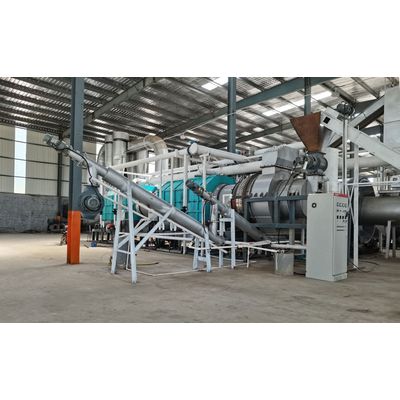

- Home
- Companies
- Beston Group Co., Ltd.
- Articles
- Coconut Shell Charcoal Machine in Food ...

Coconut Shell Charcoal Machine in Food Processing Waste Recycling
As the food processing industry continues to grow, so does the concern over the management of its waste. This article delves into the pivotal role of coconut shell charcoal making machines in waste recycling within the food processing sector. It comprehensively explores the types and environmental impact of food processing waste, introduces the innovative pyrolysis technology, and discusses the economic and ecological benefits of utilizing these machines.
Food Processing Waste: An Environmental Challenge
Diverse Types of Waste Generated
- Organic Residues: Food processing operations generate a wide array of organic waste, including fruit and vegetable peels, shells, and other byproducts.
- Packaging Materials: The industry also contributes to packaging waste, such as plastics, paper, and cardboard.
Environmental Impacts
- Pollution and Emissions: Improper disposal of organic waste leads to pollution and the emission of harmful gases, exacerbating environmental issues.
- Resource Depletion: The excessive use of packaging materials contributes to resource depletion and environmental degradation.
Coconut Shell Charcoal Making Machines: An Innovative Solution
Pyrolysis Technology Unveiled
- Pyrolysis Process: Coconut shell charcoal making machines leverage pyrolysis technology, a high-temperature conversion process that transforms waste coconut shells into valuable charcoal products.
- Coconut Shells as Ideal Feedstock: Coconut shells are chosen as the feedstock due to their high carbon content, making them ideal for charcoal production.
Environmental Benefits
- Emission Reduction: The pyrolysis process significantly reduces emissions compared to traditional waste disposal methods, contributing to cleaner air.
- Sustainable Resource Recovery: These machines promote sustainable resource recovery by converting waste into valuable charcoal, aligning with a circular economy model.
Operating a Coconut Shell Charcoal Making Machine
Feedstock Preparation
- Sorting and Shredding Coconut Shells: Waste coconut shells are sorted and shredded to prepare them for the pyrolysis process, ensuring efficient conversion.
- Managing Moisture Content: Proper moisture control is essential to optimize the pyrolysis process and maximize charcoal yield.
The Pyrolysis Process
- High-Temperature Carbonization: Within the pyrolysis reactor, coconut shells are subjected to high temperatures, resulting in the production of charcoal, gas, and liquid products.
- Collection of Charcoal, Gas, and Liquid Products: Valuable gases and liquids produced during pyrolysis are collected and further processed for various applications.
Utilizing Charcoal in the Food Processing Industry
- Charcoal Briquette Production: The charcoal produced can be used to create charcoal briquettes, which find versatile applications within the food processing industry.
- Versatile Applications: Charcoal can be applied for cooking, heating, and even as an adsorbent for purification within the food processing sector.
Economic Viability and Long-Term Sustainability
Efficient Waste Management
- Cost Savings on Waste Disposal: Implementing biochar pyrolysis equipment helps reduce the costs associated with waste disposal, contributing to economic viability.
- Generating Income through Charcoal Sales: Charcoal sales generate additional income, making the operation economically sustainable.
Embracing the Circular Economy
- Promoting Resource Efficiency: These machines promote resource efficiency by converting waste into a valuable resource, minimizing waste and optimizing resource use.
- Demonstrating Environmental Responsibility: Embracing these machines aligns with environmental responsibility, showcasing a commitment to sustainability and waste reduction.
Future Prospects and Conclusion
Expanding the Application of Coconut Shell Charcoal
As technology advances, the application of coconut shell charcoal is expected to expand into various industries, providing an eco-friendly solution for waste management and resource recovery.
Embracing Sustainable Practices in Food Processing Industry Waste Management
Investing in coconut shell charcoal making machines represents a sustainable path forward for managing food processing industry waste. It combines economic viability with environmental responsibility, offering a promising solution for a greener and more sustainable future.
